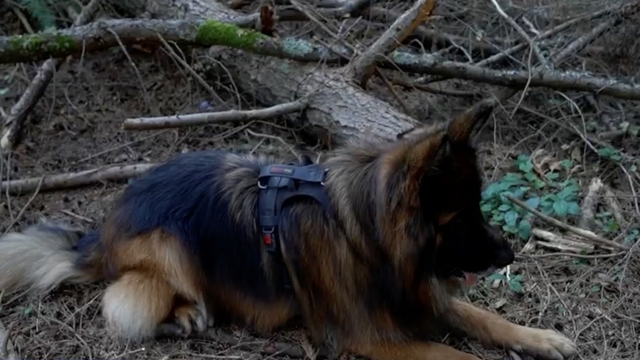Max is a long-haired German shepherd, and Lincoln is a flat-coated retriever.
Jon Izant is Lincoln's handler, and Linda Holden is Max's. They are members of King County Search Dogs, a volunteer organization in Washington state that deploys canine teams to help first responders in search and rescue or recovery missions.
Their dogs are specially trained in finding both missing people as well as finding the remains of someone who has died. A dog that searches for remains is called a cadaver dog or a human remains detection dog. It's a complex discipline that takes months of training to learn.
"Human remains or cadaver is difficult because there are many stages that a body goes through as it actually decomposes, and there are different smells associated with each one of those," said Izant.
These dogs can even go through the ashen debris of a fire, where it's impossible to find human remains visually, but a dog's nose is able to compartmentalize smells and can pinpoint the exact location of one of the many smells they're trained to identify.
SEE MORE: 99 dead from Maui wildfires; officials struggling to identify remains
It's up to the handlers to read the environment and the weather, factoring in how the scent might have moved, and interpret what their dog is signaling.
Dogs like Max and Lincoln are being used right now in Lahaina in Hawaii, which has been largely destroyed in the Maui wildfires. These dogs delicately move through charred debris, smelling every last inch to locate any human remains. There are at least 20 cadaver dogs on the ground right now in Maui.
"The people in Hawaii have a particularly difficult time given the scale, given the temperatures. It's a dangerous environment. There are sharp objects. They will work probably short periods of time and have to rest their dogs, decontaminate their dogs," said Izant.
For the dogs, this work is just a game — it has to be for them or else they wouldn't do it. For the handlers, however, it can take a serious mental toll.
"If the handler's feeling stressed and or upset about the situation, then [the dogs] will read that and it will change their behavior," said Holden.
For the handlers, they say the partnership with their dogs, which are also their personal pets, is what makes this work so effective as well as rewarding.
"This is a wonderful example, a very American example, of neighbors helping neighbors. And I'm lucky that right now I have a dog that in some circumstances can go out and help some of my neighbors when they need it," said Izant.
Trending stories at Scrippsnews.com




